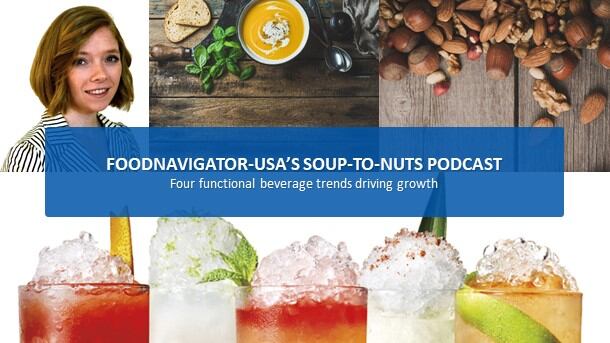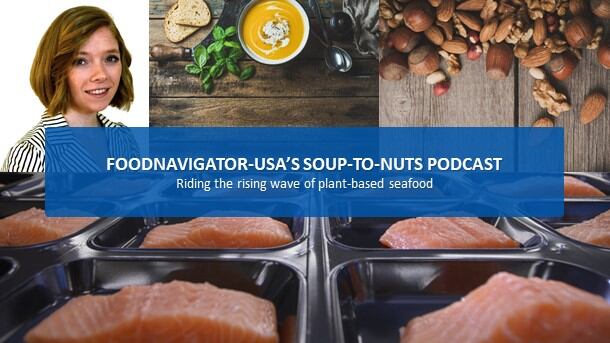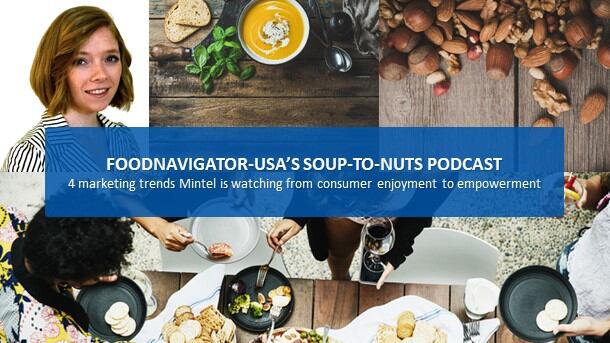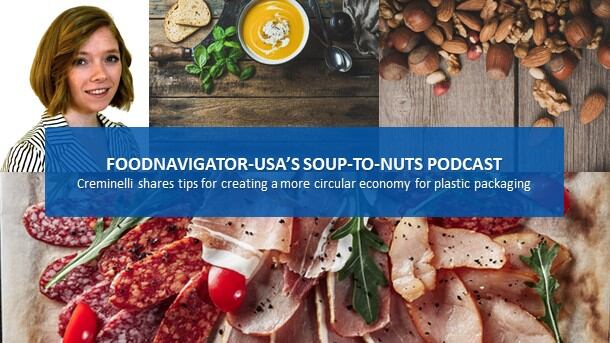Through a combination of in-depth survey data, social listening and expert analysis, the Brightfield Group’s fourth quarter Evergi research released early this year revealed that after nearly two years of heightened demand, consumer interest in immunity-boosting products appears to be flattening – dipping 2.7% in Q4 from the previous quarter – likely reflecting an increased peace of mind brought by higher vaccination rates and lower cases of COVID-19.
But the stress and fatigue from living on high-alert during the pandemic remain and are being compounded by price increases at the grocery store – prompting increased demand for products that promote relaxation and sleep, up 15.2% and 17.1% in Q4 over Q3, according to Brightfield Group. The research also found demand for products that support exercise and digestive health are up 12.8% and 7.9%, respectively.
In this episode of FoodNavigator-USA’s Soup-To-Nuts podcast, Brightfield Group managing director Bethany Gomez walks us through these shifts and the opportunities and challenges they are creating for functional product manufacturers. Brands showcasing at Natural Products Expo West in Anaheim last month also share how they are evolving to meet consumer demands and seizing opportunities across categories, including in the non-alcoholic, functional water, digestive aid, kombucha and juice segments.
[Editor’s Note: Never miss an episode of FoodNavigator-USA’s Soup-To-Nuts podcast – subscribe today.]
Consumers’ shifting needs
Understanding and predicting consumer behavior has always been an exercise in balancing dichotomies, but according to Gomez the one-two punch of the pandemic and current economy has heightened this challenge – pushing consumers to consider purchases more carefully and seek out functional products that offer more.
“We see a lot of really opposing forces that influencing [Americans’] consumption patterns. On the one side, overall consumers are … trying to be healthier, looking at more clean ingredients,” products with fewer chemicals, additives and more plants and sustainable packaging, Gomez said.
But on the other side, COVID-19 has driven stress levels to an all time high, where they have been sustained, which is pushing consumers to look for more from their products, including help with relaxation, stress relief, exercise and digestion, she said.
As inflation rises, products that can meet this demand for ‘more’ are more likely to continue to be placed in consumers’ shopping carts, she added.
Non-alcoholic options offer relaxation, health benefits
According to Gomez, one of the fast-emerging categories that is balancing consumers’ demands for relaxation, health and – a bit surprisingly – price sensitivity is the non-alcoholic beer and spirit segment.
She explained that as a premium category, non-alcoholic beverages often are priced on par with their alcoholic counterparts, but most consumers don’t consider this to be “paying a premium versus what they would pay with alcohol, but it’s really kind of a more one-to-one substitution or potentially a slight discount."
Gomez adds the non-alcoholic beer and spirits category also checks consumers’ need for relaxation by mimicking the ritual of unwinding or kicking back that is associated with alcohol, but in a better-for-you format, which allows it to check the healthier box.
She explained that 54% of consumers report they are actively trying to consume less alcohol and 45% are looking for more non-alcoholic options – representing a growing market opportunity.
“This is part of a larger society trend, especially among younger generations … who are rethinking their relationship with alcohol” and no longer consider it a requirement for social occasions, Gomez said. But she added, they also don’t want water or soda – they want a sophisticated beverage that is a treat, but also healthier for them and won’t make them stick out like a sore thumb if they are the only one not drinking alcohol.
While demand for non-alcoholic options in recent years may have been driven by younger consumers, as Gomez noted, and those who favor the bold and creative flavors of craft options, Niall Phelan, the North American president and co-CEO of The Naked Collective says the trend is spreading to older consumers and those who want an alternative to a basic but beloved lager. And this, he said, is where The Naked Collective’s non-alcoholic So.Beer shines.
“We are an unashamedly American style lager. We’re not a craft beer,” said Phelan, explaining that while he appreciates a good IPA, when he is sitting in the sun and “just chilling” he wants something lighter that he doesn’t have to think about.
And he says he isn’t alone – there are many older consumers, including Baby Boomers - who want a moderate non-alcoholic beer that they can enjoy with fewer calories and other side effects.
A science-based approach wins consumer confidence
The Naked Collection also offers consumers beverages beyond non-alcoholic beer to foster relaxation and ease stress. The company’s Mude Drinks contain scientifically supported amounts of active ingredients that empower consumers to control their mood from morning to night.
“There are a lot of products that make a lot of promises that aren’t really there. And we call it the jazz hands of the food and beverage industry. So, someone might say there is chamomile in there, but there’s about the same amount of chamomile as if you were to sniff a wild flower,” he lamented.
“What we’ve done is looked at all the scientific research, human intervention studies, to find out what the base level of” an ingredient is to have an impact, and then we blend in botanicals and other ingredients to enhance the bioavailability and benefits, he said.
Communicating the functional benefits key beverage ingredients can feel at times like walking a tightrope as companies navigate regulatory restrictions and increased consumer demand for information. The Naked Collective strikes a balance through its product names and pointing consumers to research online.
Consumers want beverages that support exercise, recovery
While relaxation and sleep are the fastest growing need states in Q4, according to Brightfield Group’s research, exercise is not far behind with a 12.8% increase in demand in Q4 over Q3 and it touches 48% of Americans.
Within exercise, according to the research, one of the most desired effects at 57.3% is hydration – which far surpasses demand for the more general “athletic performance” support at 21.8%.
This is paving the way for functional and vitamin enhanced waters such as ShineWater, which the company’s chief marketing officer Ryan Coon said is reimagining what a hydration beverage can be by providing 100% of the daily recommended vitamin D alongside essential vitamins, electrolytes and minerals without added sugar or artificial ingredients.
“There's a few different categories of hydration, you can break it into sports drinks, which is basically electrolytes, electrolytes or salts. So, it's basically salty water that is what a sports drink is. Then there's sort of the IV levels for hydration brand … those are extremely high sodium levels. Now those you're talking upwards of like 20, or 30% of your sodium intake for the day, which is really, really high for just a beverage. You shouldn't have that much sodium.
"And then we bought ShineWater, which what's considered a nutrient enhance water. … We offer the benefits of potassium, magnesium, calcium, and zinc, those are all electrolytes, because they're forms of salts. So that helps in hydration. But then we add vitamins and nutrients on top of that,” he said.
This appears to be a winning combination given that since launching at the beginning of the pandemic, ShineWater has tripled its compound annual growth rate year over year and recently signed a deal with Anheuser Busch for national distribution.
Demand for digestive support is rising
While not growing as fast the exercise, relaxation or stress need states, consumer interest in digestive health is also on the rise, according to the Brightfield Group, which saw interest increase 7.8% in Q4 over Q3 to touch 47% of Americans.
Within the beverage space, kombucha was an early front-runner which, while maturing, Gomez says is still growing to the tune of 123% year-over-year with a penetration of 7%, mainly for its digestive health benefits, which 65% of Americans seek from the category.
Given kombucha’s maturing status in the adoption cycle and the sheer number of players in the space, new and established stakeholders need to differentiate themselves in order to capture consumers’ attention and they need to deliver on their promise to keep shoppers coming back.
Bu Kombucha checks both of these boxes by offering a line organic raw kombuchas and sparkling probiotic water – both of which food safety specialist and food scientist Andreas Kummen says are refreshing and have the science to back up their functional claims.
He explained that the company’s raw organic kombucha line offers 2 billion probiotics – both natural and added spore forming strands that deliver a functional dose – and is made without any additional juice, which means the flavor comes from the fermented tea and botanicals.
The company’s new sparkling probiotic water line also offers 2 billion probiotics per can and has no sugar, and offers a lighter, less vinegary flavor profile.
The company also stands out among some of its peers by ensuring that consumers are getting the benefits they expect when they see a probiotic claim.
“Every month, we send our kombucha out for probiotic testing. And so basically, we've tried around five to 10 different strains, we found that the Bacillus coagulans holds up the best. And obviously it is in a lot of the scientific research that we've looked in, obviously, in different kinds of papers,” he explained. “The main idea was we wanted to make sure one that the customers are getting what they're paying for, and to know that to the best of our ability that these probiotics are making a difference in your body. And so that's really those are the two main questions that we try and assess every month.”
Another new player in the US the digestive health beverage category is Scrubber made by Genesis USA, which company R&D expert Scott Lafortune says is designed to compete in the kombucha category, but which offers more than probiotics.
Unofficially launching in the US at Expo West, Scrubber contains 15 grams of daily fiber from soluble and insoluble sources to help close the gap in the American diet, which is typically woefully short of fiber, along with prebiotics and probiotics for a fully functional digestive aid, Lafortune said.
The soy, citrus and corn-based fibers are visible in the beverage, but are not gritty like some fiber beverages. Rather, Lafortune said Scrubber has the mouth feel of orange juice, so it is easy to swallow and enjoy.
These are just a few examples of innovative brands that are rising to help meet the new challenges that consumers face, and while saturation and competition vary by category, and scaling can be challenging, Gomez notes that there are limited barriers to entry and with the right insights and innovation the potential is significant.
To learn more about what consumers want from functional beverages and where there is room to improve market offerings, check out Brightfield Group’s Evergi platform and insights at evergi.com.




